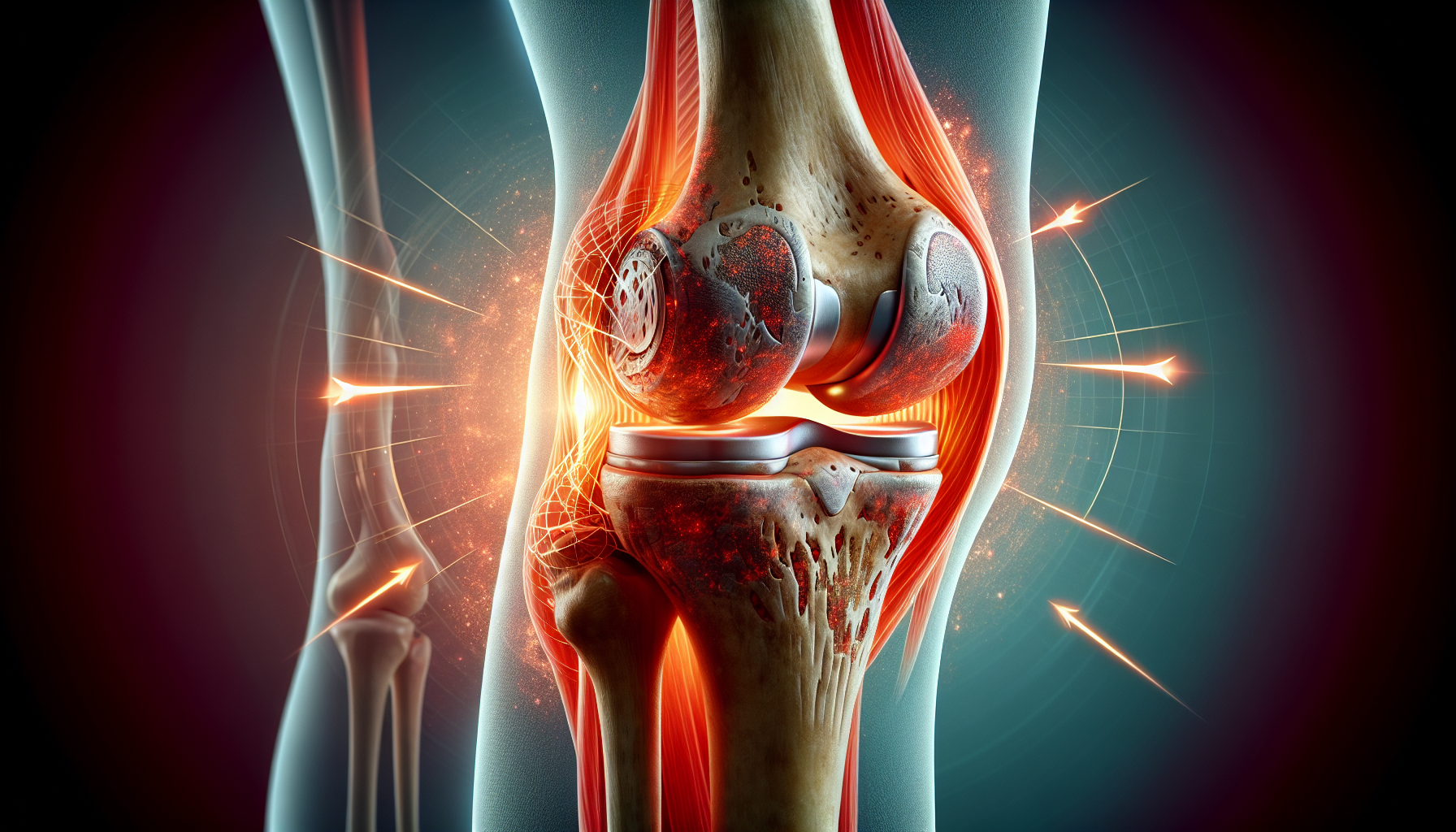Knee pain is becoming an increasingly common issue, affecting both the young and the elderly. The rise in knee pain cases can be attributed to several factors, particularly the growing overweight and obesity epidemic, along with an aging population. These two trends place extra stress on the knees, especially weight-bearing joints, leading to osteoarthritis and stiffness. The impact is significant, hindering mobility and diminishing the quality of life for many. However, relief is within reach. Finding the best joint supplement for knees can offer an effective and natural solution to alleviate pain and improve joint health.
This guide explores top supplements designed to help relieve pain and support overall joint health. We'll explore the most effective options today, from glucosamine and chondroitin to omega-3 fatty acids, vitamin D, and collagen. These joint supplements provide the nutrients your knees need and work in conjunction with lifestyle changes such as weight management, regular low-impact exercise, and a diet rich in anti-inflammatory foods. Let's discover how these supplements and intelligent lifestyle choices can help you move comfortably again.
Key Takeaways
- Knee joint pain, particularly from osteoarthritis, is prevalent among older adults and can significantly impact mobility and quality of life.
- Critical supplements for knee health include glucosamine, chondroitin, omega-3 fatty acids, collagen, MSM, vitamin D, and curcumin, each contributing uniquely to pain relief and joint support.
- Maintaining joint health also requires lifestyle changes such as weight management, regular low-impact exercise, and a diet rich in anti-inflammatory foods.
Understanding Knee Joint Pain

Knee arthritis, a condition characterized by pain, swelling, and stiffness in the joint, is a common ailment that affects millions worldwide. The most prevalent form, osteoarthritis, results from the gradual deterioration of cartilage, leading to bone friction and discomfort. On the other hand, rheumatoid arthritis, an autoimmune disorder, triggers joint inflammation, causing significant arthritis pain and swelling.
Knee arthritis risk escalates with age, especially for individuals over 50. Women are more commonly affected than men. Excess weight stresses weight-bearing joints like the knees, worsening osteoarthritis symptoms. Notably, losing just 11 pounds can halve the risk of developing knee osteoarthritis.
Osteoarthritis progresses through five stages, starting from normal joint health and potentially leading to immobility if left untreated. This progression underscores the importance of maintaining joint health to manage and prevent pain and stiffness. Understanding these factors is the first step in choosing the right joint supplements and making lifestyle changes to keep your joints healthy and pain-free.
Maintaining joint health goes beyond managing pain; it preserves mobility and quality of life. Understanding the causes and risk factors of knee joint pain allows for proactive steps to protect your joints and enhance overall well-being.
Glucosamine and Chondroitin for Knee Health

Glucosamine and chondroitin are among the most popular joint supplements, known for their ability to support joint health and mobility. These supplements are particularly effective in relieving pain, improving joint function, and reducing stiffness associated with knee osteoarthritis. A 2023 review confirmed that the combination of glucosamine and chondroitin effectively treats knee osteoarthritis, offering hope for those struggling with this condition.
These supplements work synergistically to maintain joint cartilage and support overall joint health. Glucosamine is often derived from shellfish, while chondroitin is sourced from animal cartilage. Together, they help protect cartilage, reduce joint wear, and support bone health.
Understanding their benefits requires examining each component. The following subsections explore glucosamine sulfate's and chondroitin sulfate's specific advantages, detailing their contributions to healthier, more resilient joints.
Benefits of Glucosamine Sulfate
Glucosamine sulfate is pivotal in joint supplements, and glucosamine supplements are known for repairing and reversing joint cartilage damage. It delays cartilage breakdown, relieving osteoarthritis pain and improving joint mobility, making it essential for maintaining joint health and reducing stiffness.
Studies have shown that glucosamine sulfate can significantly reduce stiffness in osteoarthritis patients compared to a placebo, highlighting its effectiveness. Moreover, its pain-relieving capabilities are comparable to well-known medications like Tylenol and Celebrex. The recommended daily dosage is 1,500 mg, generally safe for up to three years.
One of the remarkable benefits of glucosamine is its ability to lubricate joints and retain water in cartilage, preventing further breakdown. This dual action helps reduce joint pain and supports long-term joint health, making glucosamine sulfate a staple in the regimen of anyone suffering from joint issues.
How Chondroitin Sulfate Supports Joint Health
Chondroitin sulfate, another vital joint supplement, enhances cartilage’s shock-absorbing properties and prevents breakdown. It plays a crucial role in maintaining healthy joints by reducing wear and tear, essential for knee osteoarthritis patients.
The recommended dosage of chondroitin sulfate is 400 mg, taken three times a day, ensuring consistent support for joint health. When used with glucosamine, chondroitin sulfate can help reverse cartilage loss, providing a comprehensive approach to joint care.
Chondroitin sulfate is a naturally occurring compound found in cartilage, underscoring its importance in joint function and health. Integrating chondroitin supplements into your daily routine supports your joints’ structural integrity and enhances their ability to absorb shocks and stresses.
Omega-3 Fatty Acids for Inflammation
Omega-3 fatty acids are well-known for their anti-inflammatory properties, making them valuable to any joint health regimen. These fatty acids have been shown to alleviate pain and improve joint function in cases of osteoarthritis and rheumatoid arthritis. They encourage the production of chemicals that help manage inflammation, which is crucial in controlling joint stiffness and swelling.
Fish oil is a common source of omega-3 fatty acids, but vegetarian options like algal oil also offer beneficial DHA and EPA without relying on fish. Studies have demonstrated that high doses of fish oil, exceeding 2.6 grams per day, can significantly lower inflammatory biomarkers, while even low doses can improve function and pain scores.
Adding omega-3 fatty acids to your diet or as a supplement can combat inflammation and support overall joint health. Fish oil capsules or plant-based alternatives provide a natural way to reduce joint pain and enhance mobility.
For a focused look into vegan options, I recommend our article, “From Algae to Awesomeness: Five of The Best Vegan Omega-3 Supplements You Need to Know.” This review focuses on five top vegan Omega-3 supplements found on Amazon, each rigorously evaluated to meet the high standards of purity and effectiveness discussed here.
Collagen Supplements for Knee Support

Collagen supplements have gained popularity because of their potential to support joint health and alleviate pain. Studies suggest that taking 2.5 to 15 grams of hydrolyzed collagen daily can benefit joint health. Unlike undenatured collagen, hydrolyzed collagen is more easily absorbed by the body, making it a more practical option.
For those looking to boost joint health, collagen supplements have become a go-to solution. Notably, Type II collagen, found abundantly in cartilage, is vital in supporting joint health and alleviating joint pain. Since collagen production naturally decreases with age, starting as early as 25, adding a high-quality supplement to your routine can make a noticeable difference in joint function and resilience.
If you're interested in finding the right collagen supplement, check out our article, “The Secret's Out! Discover The Top 5 Collagen Type 2 Supplements.”This guide highlights five of the best collagen supplements available on Amazon, offering valuable options for those aiming to support joint health and maintain an active lifestyle. Explore which product might be the perfect fit for your wellness regimen.
MSM (Methylsulfonylmethane) for Joint Pain Relief
MSM (methylsulfonylmethane) is a powerful supplement for reducing joint inflammation and pain. Research shows MSM can alleviate pain and swelling associated with knee osteoarthritis, making it a valuable addition to joint health regimens.
Found naturally in small amounts in foods like fruits, corn, and coffee, MSM levels in supplements are significantly higher, providing more substantial benefits. A daily dosage of 3 grams has been found effective, most tolerating up to 4 grams well.
MSM is often included in joint supplements alongside glucosamine and chondroitin, offering synergistic effects that enhance overall joint health. By incorporating MSM into your supplementation routine, you can experience significant reductions in pain and stiffness, supporting a more active lifestyle. So, if you’re considering MSM supplements, you might wonder which product is right for you.
Our article, “MSM Marvels: Unlocking the Secrets of The Five Best MSM Supplement Game-Changers,” reviews five top MSM supplements available today. This guide can help you quickly and easily find the best option for your needs, saving you time while helping you take the next step toward better joint health.
Vitamin D and Bone Strength
Vitamin D is crucial for bone strength, regulating calcium levels, and ensuring proper absorption. Although data on its effects on joint pain is limited, its role in maintaining strong bones is well-documented. Low vitamin D levels are linked to conditions like rheumatoid arthritis, making it important to check levels if you experience joint pain.
Supplementing with vitamin D can help prevent deficient bone density, which is crucial for overall joint health. Incorporating vitamin D into your diet or as a supplement can support bone health and enhance the effectiveness of other joint supplements. Ensuring adequate vitamin D levels is a simple yet effective way to maintain strong, healthy joints.
Curcumin's Anti-Inflammatory Properties
Curcumin, the active compound in turmeric, is celebrated for its anti-inflammatory properties. It alleviates osteoarthritis pain and stiffness, often showing results comparable to NSAIDs (Nonsteroidal Anti-Inflammitory Drugs) without severe side effects. A systematic review found curcumin improves symptoms and reduces arthritis-related inflammation to relieve arthritis pain by targeting and inhibiting inflammatory cytokines and enzymes.
Curcumin supplements should be taken with fats for optimal results to improve absorption. A daily dose of 500 mg of high-quality curcumin, taken twice daily, is recommended for managing osteoarthritis and rheumatoid arthritis. Incorporating curcumin into your supplementation routine can significantly reduce inflammation and improve joint health. However, with so many products on the market, finding the right curcumin supplement can be overwhelming.
To help you make the best choice, check out our article, “The Top Turmeric/Curcumin Supplements For Joint Pain And Inflammation.” This guide reviews seven of the top-leading brands and highlights the many benefits of this potent herb. Whether you’re managing osteoarthritis, rheumatoid arthritis, or simply looking for a natural way to support joint health, this resource can save you time and help you find the perfect supplement for your needs.
Choosing the Right Joint Supplement for Knees

Choosing the right joint supplement can be daunting, but understanding key factors simplifies the process. Assessing the quality and type of ingredients is crucial for effectiveness. Look for formulations with multiple beneficial ingredients to enhance the overall effect.
Check for potential interactions with medications and allergens before purchasing dietary supplements. Reading reviews and testimonials can provide valuable insights into a product’s performance. Choose the delivery method, such as capsules or powders, based on personal preference.
Before starting any joint supplement, please consult a healthcare provider to ensure it aligns with your health history, symptoms, and current medications. Considering these factors helps you choose the best supplement to support knee health and alleviate pain effectively.
Additional Tips for Knee Joint Health

Beyond supplements, several lifestyle changes can support knee joint health. Eating anti-inflammatory foods, like fish, walnuts, and olive oil, aids in weight loss and alleviates joint pain. These foods help reduce inflammation, which is crucial for managing arthritis symptoms.
Incorporating low-impact activities like swimming, yoga, and resistance training helps manage weight and reduce joint pain. These exercises strengthen muscles around the knees, improving joint stability and reducing further damage risk. Some studies suggest MSM aids in recovery after exercise, making it a valuable addition to your routine.
Vitamin D also supports muscle function, which is necessary for balance and reducing fall risk. Ensuring adequate vitamin D through sunlight exposure, diet, or supplements supports bone health and overall joint mobility. Combining these tips with the right supplements creates a comprehensive approach to maintaining healthy, pain-free knees.
Wrapping Up Our Discussion On Joint Supplements
In summary, effectively managing knee joint pain involves more than just finding the right supplement—it requires a holistic approach that includes proper nutrition, regular low-impact exercise, and mindful lifestyle changes. Supplements like glucosamine and chondroitin are widely recognized for supporting joint health and easing osteoarthritis symptoms. Meanwhile, omega-3 fatty acids, collagen, MSM, vitamin D, and curcumin offer additional benefits that can help reduce inflammation, strengthen cartilage, and improve joint mobility.
Choosing the best supplement for your knees involves understanding the quality of the ingredients, considering potential interactions—especially with blood thinning medications—and knowing what works best for your individual health needs. It’s always wise to consult with a healthcare provider before starting new dietary supplements, ensuring they complement your existing treatments and support your joint health goals.
The links provided throughout this article offer invaluable information for anyone starting their journey toward healthier, pain-free knees. By integrating these high-quality joint supplements and embracing a well-rounded lifestyle, you can protect your joints and improve your quality of life. Remember, maintaining healthy joints is key to staying active and enjoying all of life's movements, big and small.
Brief Answers to Common FAQs
What are the best joint supplements for knee osteoarthritis?
The optimal joint supplements for knee osteoarthritis are glucosamine and chondroitin, omega-3 fatty acids, collagen, MSM, vitamin D, and curcumin, which collectively aid in pain relief, enhance joint function, and promote joint health.
How does glucosamine sulfate help with joint pain?
Glucosamine sulfate is effective in helping with joint pain by repairing and maintaining joint cartilage, reducing stiffness, and lubricating the joints. This helps prevent further breakdown of cartilage, leading to improved mobility and comfort.
Can omega-3 fatty acids reduce inflammation in the joints?
Yes, omega-3 fatty acids can effectively reduce joint inflammation due to their anti-inflammatory properties, aiding in managing joint pain and stiffness. Their role in encouraging the production of inflammation-regulating chemicals is essential for maintaining joint health.
What is the recommended dosage for MSM?
The recommended dosage for MSM is typically 3 grams daily, with many individuals tolerating up to 4 grams. Always consult with a healthcare provider to ensure appropriate use.
How can I choose the right joint supplement?
To choose the right joint supplement, evaluate the quality of ingredients, check for allergens and interactions, and consult a healthcare provider for personalized advice. This thorough approach will help ensure the supplement meets your health needs.
Thanks for taking this journey to explore the best joint supplement for knees. If you want to add to your library of knowledge and are interested in diving deeper into some of the supplements mentioned in this article, you should check out the links above. It could be a huge time-saver - you won't be sorry you took a look.
Also, please return soon to check out our next review of other incredible supplements – we’re always looking out for YOU!
*We are NOT qualified medical advisors. The content here is only based on our personal opinions and research and should NOT be used as a substitute for a healthcare professional's advice!











Member discussion